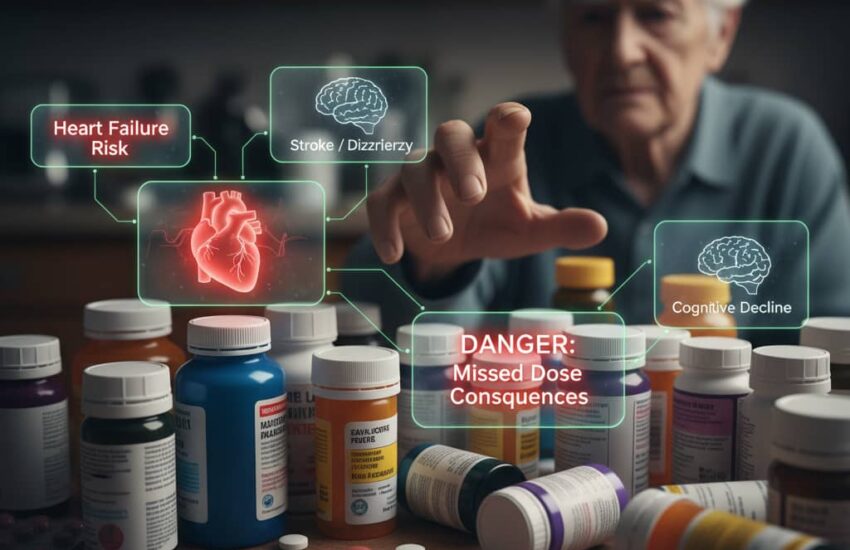Medication non-adherence in seniors is a hidden health crisis. Discover the real risks, the surprising reasons it happens, and practical strategies to ensure medication safety at home. I found my grandfather’s heart medication tucked inside a book, hidden behind cereal boxes, and scattered at the bottom of his gardening coat pocket. When I asked him about the missing pills, he looked genuinely confused. “I take them when I need them,” he explained, not understanding that his blood pressure medicine wasn’t like aspirin for a headache. This scattered trail of pills wasn’t an act of defiance; it was a cry for help from a man overwhelmed by a complex regimen he no longer understood. That moment revealed how medication non-adherence isn’t just about forgetting; it’s a complex web of cognitive, physical, and psychological barriers that can silently undermine a senior’s health.
The statistics surrounding medication non-adherence are sobering. It’s estimated that up to half of all medications for chronic conditions are not taken as prescribed, leading to 125,000 preventable deaths annually in the United States alone. For seniors managing multiple chronic conditions, the consequences are particularly severe. A missed blood thinner can lead to a stroke. An improperly dosed diabetes medication can cause dangerous blood sugar swings. Skipping a heart medication can result in hospitalization for congestive heart failure. The risks extend beyond the individual, costing the healthcare system billions each year in emergency room visits, hospital readmissions, and complications that proper medication management could have prevented.
The reasons behind non-adherence are as varied as the individuals themselves. For some, it’s the sheer complexity of managing multiple prescriptions with different dosing schedules. I’ve seen pill organizers that look like intricate chessboards, with compartments for morning, noon, evening, and bedtime across seven days, a system that would challenge anyone, let alone someone with fading eyesight or mild cognitive impairment. For others, the cost becomes prohibitive. I’ve sat with seniors who were literally choosing between their medication and their groceries, a heartbreaking decision no one should have to make.
Side effects represent another major barrier. When a medication causes dizziness, nausea, or fatigue, the immediate relief of stopping often outweighs the abstract fear of a future health crisis. My grandmother once confessed she’d stopped taking her arthritis medicine because it “made her feel foggy,” preferring physical pain over mental cloudiness. Without a safe space to discuss these side effects, seniors often make unilateral decisions that put their health at risk.
Cognitive decline naturally affects medication adherence. Mild cognitive impairment can disrupt the executive functions needed to manage a complex medication schedule, remembering if a dose was taken, understanding the timing, and recognizing the importance of consistency. What looks like stubbornness is often genuine confusion. I’ve worked with families who discovered their loved one was either double-dosing or skipping doses entirely, not out of carelessness, but because the mental machinery for tracking had simply worn down.

The physical challenges are frequently overlooked. Arthritis in the hands can make it difficult to open child-proof caps. Poor eyesight can turn prescription labels into blurry mysteries. I once visited a client who was taking her morning medication at night because she couldn’t read the tiny “AM” and “PM” on her pill organizer. These simple physical barriers can completely derail a carefully planned treatment regimen.
Perhaps the most insidious barrier is what healthcare providers call “health literacy”, the ability to understand why a medication is important. When patients don’t grasp the connection between taking a pill today and preventing a hospital visit six months from now, adherence naturally suffers. I’ve found that explaining medications in terms of what they help seniors continue doing—”This blood pressure medicine helps you keep gardening without getting dizzy”, proves far more effective than abstract medical explanations.
The solutions require a multi-layered approach that begins with honest communication. Creating a non-judgmental environment where seniors can admit they’ve missed doses is crucial. Blame and frustration only drive the problem underground. Instead, asking “What’s making it hard to take your medications?” opens the door to practical solutions.
Technology offers promising tools, from simple pill organizers with timer alarms to sophisticated automated dispensers that lock and provide alerts to family members. For some, a simple weekly pill sorter with large compartments and bold lettering makes all the difference. For others, smartphone apps that provide reminders and track adherence can help. The key is matching the solution to the individual’s capabilities and comfort with technology.
Simplifying medication regimens is another powerful strategy. Working with doctors to consolidate doses, switch to combination pills, or align medication times with daily routines can dramatically improve adherence. I’ve seen remarkable success when pharmacists conduct “brown bag medication reviews,” where seniors bring all their medications in a bag for a comprehensive review and simplification.
Family support, when properly balanced, can be transformative. Regular check-ins, help with prescription refills, and accompanying seniors to doctors’ appointments all contribute to better adherence. The goal is assistance without infantilization, preserving dignity while providing support. One family I worked with created a shared calendar where their mother could check off doses while giving them peace of mind through gentle monitoring.
The most effective approaches often combine multiple strategies. A clear pill organizer paired with a simple alarm clock, regular pharmacy delivery, and a family member who calls every evening to chat about the day’s medications can create a safety net that catches problems before they become crises.
What began with my grandfather’s hidden pills became a journey toward understanding that medication adherence isn’t a simple matter of compliance, but a complex dance of cognitive ability, physical capability, financial resources, and psychological acceptance. By addressing the root causes with compassion and practical solutions, we can help seniors maintain their health and independence while respecting their dignity and autonomy. The goal isn’t just getting pills from the bottle to the mouth; it’s ensuring that those pills serve their purpose of preserving quality of life.
References
Georgetown University School of Nursing. (2022, June 28). Improving medication adherence in older adults. Retrieved from https://online.nursing.georgetown.edu/blog/improving-medication-adherence-in-older-adults/
Cao, W., et al. (2022). Medication non-adherence and associated factors among older adult stroke survivors in China: A cross-sectional study. *Frontiers in Pharmacology, 13*, Article 1054603. https://www.frontiersin.org/articles/10.3389/fphar.2022.1054603/full
Jeyalakshmi, K., et al. (2023). Determinants of medication non-adherence among the rural elderly with co-morbid chronic conditions. *PMC*, Article PMC10351531. https://pmc.ncbi.nlm.nih.gov/articles/PMC10351531/
Fadil, H. A., et al. (2023). Prevalence of nonadherence to medications among older adults. *PMC*, Article PMC10630004. https://pmc.ncbi.nlm.nih.gov/articles/PMC10630004/
Centers for Disease Control and Prevention (CDC). (2023). National health statistics reports on prescription medication adherence in older adults. Retrieved from https://www.cdc.gov/nchs/data/nhsr/nhsr209.pdf

